#koreanstudyblr
Text
Happy Pride! Let’s look at some Korean LGBT+ Terms

엘지비티: LGBT
레즈비언: Lesbian
게이: Gay
양성애: Bisexual
트랜스젠더 (or 트렌스): Transgender
퀴어: Queer
인터섹스: Intersex
무성애자: Asexual
퀘스처닝: Questioning
범성애자: Pansexual
얼라이: Ally
바이젠더: Bigender
에이젠더: Agender
논바이너리: Nonbinary
이성애: Straight
트랜스여성: Trans woman
트랜스남성: Trans man
씨스젠더: Cisgender
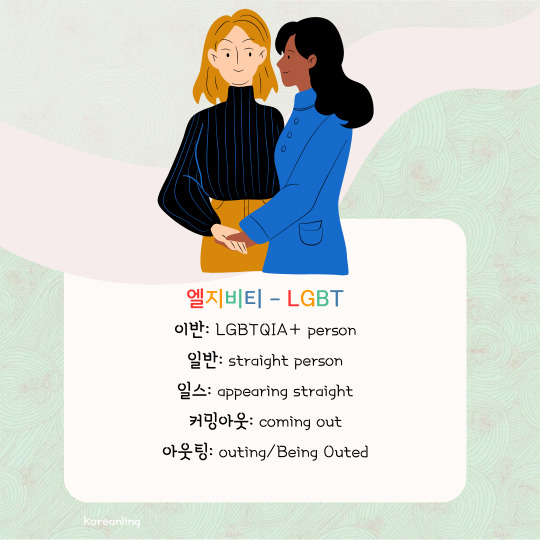
Some Quick LGBT Slang
이반: LGBTQIA+ person (이반인 “abnormal people” – note: not derogatory lgbt claimed this themselves)
일반: straight person (일반인 “normal people”)
일스: appearing straight (short for “일반 스타일 “normal style”)
커밍아웃: coming out
아웃팅: outing/being outed – someone exposes you and forces you out
78 notes
·
View notes
Text



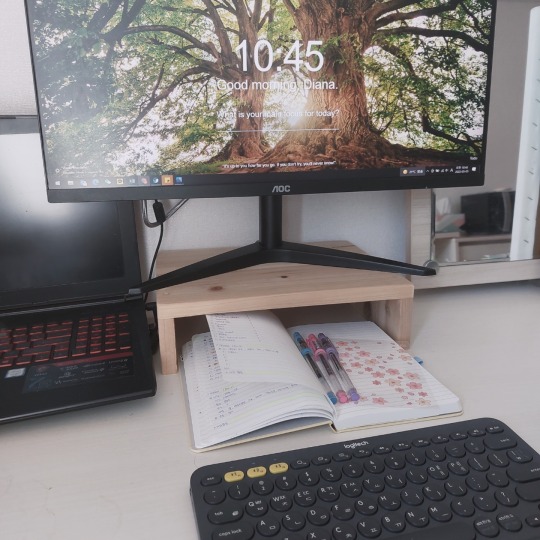
Days of Productivity 13/100 | May 5th, 2022
I have always considered myself a perfectionist.
I thought that was why I was always behind my time schedule , and cramming for the due dates.
But that was not the case, now I see that I was just scared to admit that I couldn't bear the disappointment that would come from the smallest failure.
I know I would not be able to fix this in a day or two, but I am going to try doing things one by one, even if that means that the results will disappoint me. At least I gave a shot before it's too late.
“Everything you’ve ever wanted is on the other side of fear” – George Addair
🎵 Christopher-Bad
1 note
·
View note
Text
Masterlist

I decided to create a master list of all my blog posts. I only included the ones I wrote myself, you won’t find any reblogged posts here :)
GETTING STARTED
# How To Start Studying Korean
# Study Technique (Ask)
# Study Notebook (Ask)
MISCELLANEOUS
# Introduction
# The Issue With Calling People Koreaboo - A Short Essay
# Life Update (October 2019)
# 5 Things That Make Me Happy
# Where I have been (2022)
GRAMMAR
# Important Grammar - Ending Consonants - 받침
# Beginner Grammar - To Have To Do Sth./Should Do Sth. -~아/어/여야 하다/되다
# Beginner Grammar - Nominalisation -는 것 & -기 & -(으)ㅁ
# Beginner Grammar - About Sth./Concerning Sth. -에 대해(서) & -에 관해(서)
# Beginner Grammar - If/When -(으)면 & -(으)ㄹ 때
# Intermediate Grammar - Speaker’s Assumption -(으)ㄹ 텐데
# Confusing Grammar 1 - Shall We...?/Doubts/Asking Oneself/Wondering -(으)ㄹ까(요)?
# Confusing Grammar 2 - Some-(one/time/where) -ㄴ가
# Confusing Grammar - If/When -(으)면 & - (으)ㄹ 때
# Confusing Grammar - Usage of 보다 in BTS and TXT song (Ask)
VOCABULARY
# Adverbs of Frequency
# Vocabulary - Nature
# Vocabulary - Halloween
# Random Vocabulary 1
374 notes
·
View notes
Text
Hanja Lesson - Directions
동 東 east
서 西 west
남 南 south
북 北 north
하 下 bottom, down
상 上 top, up
좌 (왼쪽) 左 left
우 (오른쪽) 右 right
내 (안) 內 inside
외 [외, 웨] (밖) 外 outside
전 (앞) 前 before, in front
후 (뒤) 後 after, behind
좌우 左右 left and right
전후 前後 before and after; front and behind
동서남북 東西南北 the four directions east, west, south and north
남한 南韓 South Korea
북한 [부칸] 北韓 North Korea
동대문 東大門 The East Gate
남대문 南大門 The South Gate
북대문 北大門 The North Gate
서대문 西大門 The West Gate
중동 中東 Middle East
북미 [붕미] 北美 North America
중남미 中南美 Latin America and the Caribbean
오전 午前 morning, forenoon
오후 午後 afternoon
국내 國內 [궁내] interior of a country; domestic territory
외국 外國 [외국; 웨국] foreign country
외식 外食 [외식; 웨식]
외국어 外國語 [외구거; 웨구거] foreign language
식전 食前 before a meal
식후 食後 after a meal
후식 後食 dessert
*the words in the "()" brackets are the native korean words
**the words i the "[]" brackets are how the words are pronounced
#korean language#korean#korean vocabulary#korean study#hanja#hanja lesson#korean studyblr#koreanstudyblr
7 notes
·
View notes
Photo








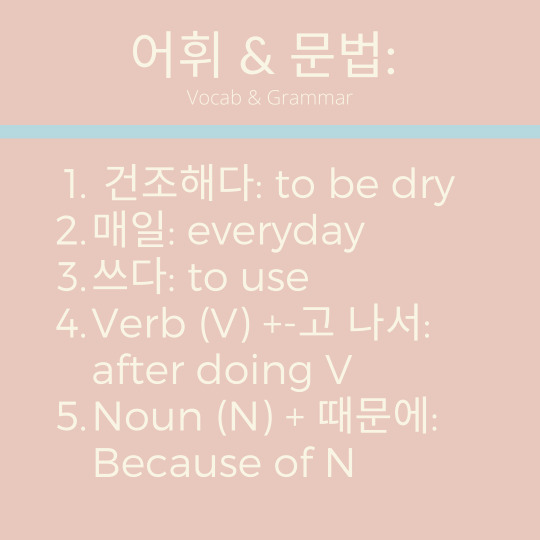
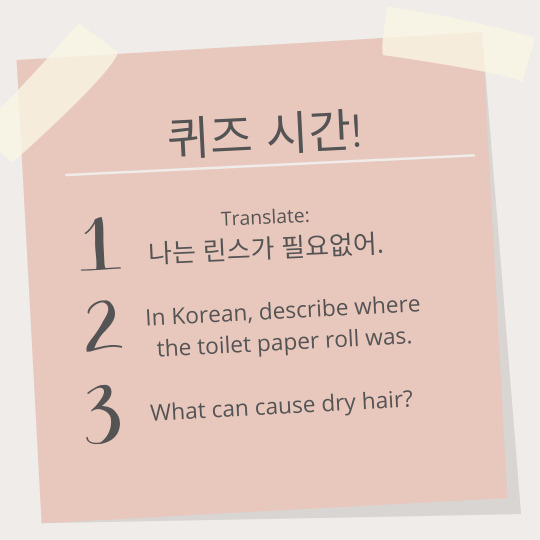
Bathroom Vocab Pt. 2 made with the help of @learningkoreanfromtoday ✨💛 Remember to take the quiz at the end and comment your answers below. Are there any sentences you don’t understand? Try translating them to improve your Korean. (Please let me know if there are any mistakes. I’m still a beginner 🙈)
#studykorean#learnkorean#studygram#languagelearning#languagestudyblr#koreanstudyblr#studymotivation#studyresources#languagelearningresources#koreanvocab#koreanvocaboftheday#studywithme#aprendecoreano
2 notes
·
View notes
Text
Korean words in school campus
Korean words in school campus
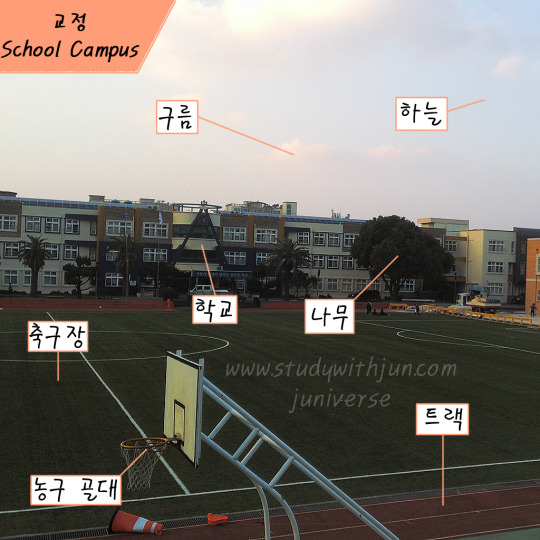
교정 (School Campus)
구름 (Cloud)
하늘 (sky)
학교 (School)
나무 (Tree)
트랙 (Track)
축구장 (Soccer field)
농구 골대 (Rim)
#Korean language#Koreansentences#Koreanstudyblr#Korean words#Korean practice#Korean study#Korean language learning#studywithjun#juniverse
33 notes
·
View notes
Text
Korean Fall Vocab

─── · 。゚☆: *.☽ .* :☆゚. ───
가을 - Fall/Autumn
잎 -Leaf/Leaves
할로윈-Halloween
단풍 - Fall foliage
스웨터 - Sweater
호박 - Pumpkin
쌀쌀한 날 - Chilly Day
달 - Moon
갈퀴 - Rake
다람쥐 — squirrel
도토리 — acorn
밤 — chestnut
단풍잎 — maple leaf
가을 — autumn
허수아비— scarecrow
#korean#korea#korean langblr#koreanstudyblr#study#studyblr#langblr#fall#autumn#korean vocab#korean vocabulary
140 notes
·
View notes
Text
LEARN WITH K-POP 🌸🌊 The Truth Untold - 방탄소년단 (전하지 못한 진심) Beginner/beg. Intermediate PART 1 - VERSE 1 AND CHORUS 1

Hey friends! I’ve decided to help you guys learn with K-Pop and the first song I’ve decided to break down for you guys is The Truth Untold by BTS, kindly requested by user @studymila... hope y’all enjoy!
VERSE 1
외로움이 가득히 - full of loneliness
❀외롭다 (to be lonely) 외로움 (loneliness)
✿가득하다 (to be full of) 가득히 (full to the brim)
피어있는 이 garden - this blooming garden
❀피어있다 (to be in bloom) VERY IMPORTANT GRAMMAR POINT! Linked at the end as ‘Nominalisation’
가시투성이 - prickly (with thorns)
❀가시 (thorns)
이 모래성에 난 날 매었어 - I tied myself to this sandcastle
너의 이름은 뭔지 - what’s your name?
❀너의 (you + possessive 의 = your), 이름 (name)
✿뭔지 sort of shows an “I don’t know what your name is” feeling... this is technically a grammar point but it is quite advanced, so I won’t explain it until it is requested...
갈 곳이 있긴 한지 - maybe there’s a place to go
✿곳 (place) 갈 = future tense - taken from 갈 거예요) therefore 갈 곳 means a place to go (in the future)
Oh could you tell me -
❀ as I was talking about, he doesn’t know those 2 things, (the name or whether there’s a place to go). We understand this from the -ㄴ 지 grammar point.
이 정원에 숨어든 널 봤어 - I saw you hiding in the garden
❀정원 (garden) -에 (location particle)
✿숨다 - to hide (yourself) 숨기다 - to hide something else from someone. although there is a very subtle difference between the meanings and spellings of these words, it is quite important that you don’t mix them up as they still have different meanings.
❀널 = 너를. I SEE 보다 = (past tense) I SAW 봤어.
And I know
너의 온긴 모두 다 진짜란 걸 - All your warmth is real
❀온긴 (warmth) 모두 다 (all, absolutely all 100%) 진짜 - real
✿the 란 걸 grammar is a little bit too advanced in my opinion, but I may end up posting about it later on so look out for that :) If you are very interested in learning about this, TTMIK has a lesson on it.
푸른 꽃을 꺾는 손 잡고 싶지만 - I want to hold the hand that picks blue flowers, but...
❀푸르다 - 파랗다 - blue
✿꽃 (flower) 꽃을 꺾다 (to pick flowers)
❀꽃을 꺾는 손 - the hand that picks flowers - CHECK NOMINALISATION GRAMMAR
✿잡다 (to grab/hold) 잡고 싶다 (to want to grab/hold) VS+고 싶다 = to want to do “verb”
❀하지만 (but), it can be attached to any other verbs for example in the case of this song, 잡고 싶지만... I want to hold, but...
CHORUS
내 운명인 걸 - It’s my destiny
❀운명 (destiny)
Don’t smile on me, light on me
너에게 다가설 수 없으니까 - because I can’t get close to you
❀ -에게 = to... 너에게 = to you
✿다가서다 (to get close to, approach, draw near, come close)
❀-(으)ㄹ 수 없다 ----- I WILL MAKE SURE TO WRITE A GRAMMAR POST ABOUT THIS but it means ‘can’t’ or ‘to have no ability to’
✿-(으)니까 ------- I WILL ALSO WRITE A GRAMMAR POST ABOUT THIS LOL I’M KINDA SHOOK I HAVEN’T DONE IT YET... but in this case it essentially means ‘because’
내겐 불러줄 이름이 없어 - I don’t have a name to call you
❀불러 (부르다) - to call out (often used for activities that use ‘air’ such as singing, winded or brass instruments, or in this case calling out to someone)
✿불러주다 = 부르다 + 주다, the addition of 주다 gives us the indication that this is an action given to someone or doing it for someone. In this case, it pretty much is like to call out TO YOU or FOR YOU.
❀내겐 = 나에게는
✿없어 (to not have/to not exist)
You know that I can’t
Show you me, give you me
초라한 모습 보여줄 순 없어 - I can’t show you my poor/run-down appearance
❀초라하다 (to be shabby/run-down) 모습 (appearance) 초라한 모습 (shabby appearance)
✿보여주다 (to show someone something)
또 가면을 쓰고 널 만나러 가 - I’m going to wear a mask and go see/meet you
❀ 가면을 쓰다 (to wear a mask)
✿또 (again) 널 = 너를
❀만나다 (to meet), 만나러 가다 (to go (to) meet), VS+러 가다 = to go to VERB
THAT’S ALL FOLKS!!
For part 1, that is ;) Please let me know if you have any questions or if you have any corrections to make. I know my translations are not 100% perfect, but remember that Korean is not always 100% translateable haha.. alright hope you all have an amazing day!! I will post Part 2 in the next few days, so look out for that :)
감사합니다!!
MARKERS!!! - very important to help you understand the beginner concept of markers in the korean language.. things such as 은/는, 을/를, & 이/가..
NOMINALISATION!!! - this was mentioned throughout the post multiple times and that’s because it is SO!!! IMPORTANT!!! make sure to look through this post if you can’t understand
#bts#bangtan#bts v#bts namjoon#rm bts#jimin#the truth untold#lyrics#translation#k-pop#kpop#korea#south korea#learn korean#korean learning#koreanstudy#koreanstudyblr#jhope#jungkook#suga#yoongi#motivation#study motivation#korean study blog#studyblr#studylbr#kpopidols#nct127#blackpink#twice
208 notes
·
View notes
Text
Lesson 18: BT21 Where you AT? (Location marking particles)
A short lesson!
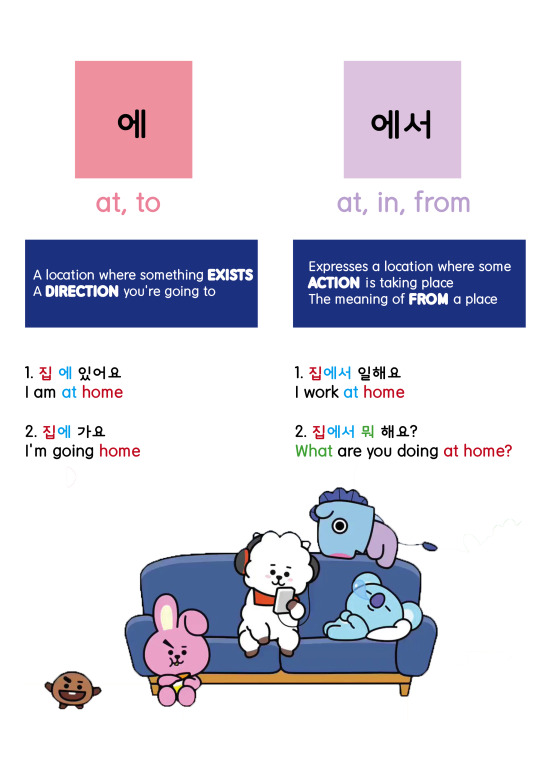
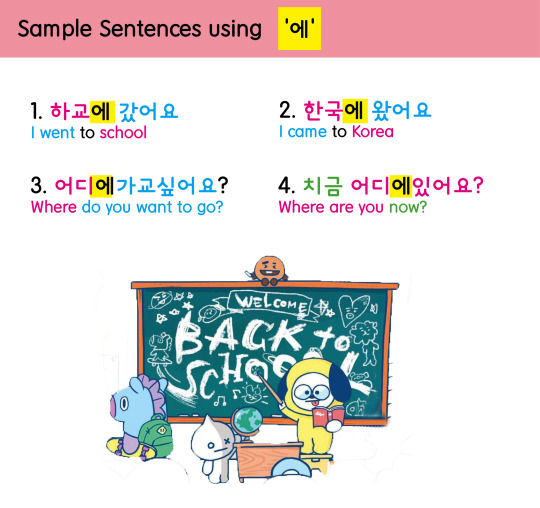

Also a list of helpful verbs from the TTMIK LESSON
오다 [o-da] = to come
왔어요 [wa-sseo-yo] = came / to have come
있다 [it-da] = to be, to exist
있었어요 [i-sseo-sseo-yo] = was / to have been
보다 [bo-da] = to see
봤어요 [bwa-sseo-yo] = saw / to have seen
하다 [ha-da] = to do
했어요 [hae-sseo-yo] = did / to have done
#TTMIKBeginner#BT21#ttmik#learn korean#languages#language#korean#korean studyblr#koreanstudyblr#korean langblr#koreanlangblr#koreanstudynotes#korean study notes#korean vocab#korean grammar#korean study blog#location#location particles#BTS#bt21 cooky#bt21 rj#bt21 tata#bt21 chimmy#bt21 shooky#bt21 koya#bt21 mang
430 notes
·
View notes
Text

All my books in Korean!
1 note
·
View note
Text
을 /를 are not as important as you think
When I was learning in school, my professors really emphasized using things object marking partitcles but after I moved to Korea, I realized it’s a sure fire way to sound super foreign if you constantly use them while talking. I don’t see them written often either unless it’s to clarify something.
The way we’re taught to say something: 저는 라면을 먹고싶어요
The way Korean people actually talk: 라면 먹고싶어요.
Korean grammar is daunting but you can rest assured a lot of things aren’t used in daily speech because nobody has time for that.
2 notes
·
View notes
Text
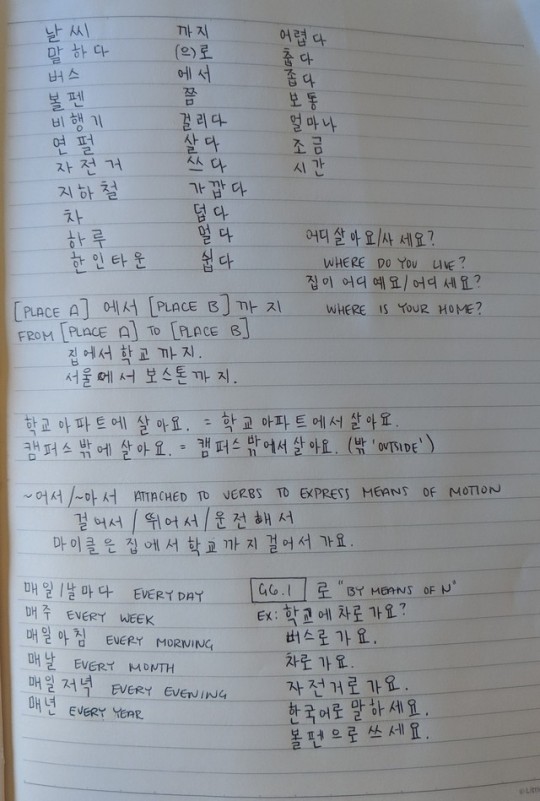
These are my notes from today's Korean studies
(2-24-19)
New Vocabulary:
날씨- weather
말(하다)- speech/words
버스- bus
볼펜- ball point pen
비행기- airplane
연필- pencil
자전거- bicycle
지하철- subway
차- car
하루- one day
한인타운- Korea town
까지- up to(location)
(으)로- by means of
에서- from(location)
쯤- about/ around
This is from the KLEAR Beginning 1 workbook (Lesson 6)
#south korea#koreanstudyblr#korea#learn korean#korean#incorrect kpop quotes#kpop#today i learned#learning#learn#langblr#language#study#studyspo#studyblr#studying#study aesthetic#study notes#study motivation#studygram
10 notes
·
View notes
Text


@nox-luceo
2022.05.04/Seoul, Korea
0 notes
Note
Hey I have a question about the use of 봐, -In BTS's Zero o' Clock there is a line: 어지러운 밤 문득 시곌 봐, which means "look at the spinning night", right? -In 20cm by TXT the line "발을 맞춰 자라났나 봐" means must have grown in sync. so here 봐 doesn't mean look. I'm a bit confused about the use of 봐 now...
Hello Anon :) first of all, thank you for asking. I'll try my best to explain! [Update May 12:... I kind of forgot this was in my drafts, so that's why I answering your question this late...I deeply apologise :( ]

Your first example was the lyrics from BTS' Zero o'clock.
"어지러운 밤 문득 시곌 봐."
Let's break this sentence down first:
어지럽다 = dizzy (of [complex] emotions)
-> something is not solved and makes you 'tired'
밤 = night
문득 = suddenly
-> happens impulsively; unexpectedly
시곌 = 시계 + ~(르)ㄹ [object marker] = the clock
-> It is very common in Korean to contract words with the particles. An easy example would be 나는 changing to 난.
봐 = 보다 + ~아/어/여 [present tense] = to look at (sth.)
The entire lyric translated would be something along the lines of:
"In the dizzy/spinning night I suddenly glanced at the clock."
As you can see, 봐 means 'to see/lok/...' in this case :)

Now on to the second lyric by TXT's song:
"발을 맞춰 자라났나 봐"
The whole lyrics during this part goes
"커진 키와 널 향한 맘 / 발을 맞춰 자라났나 봐"
I won't explain the first part since it wasn't part of your question and we want to focus on the meaning of 보다 in the second sentence. But I think it's important to mention it nonetheless, since there is no subject in the second sentence: "발을 맞춰 자라났나 봐"
blue = idiomatic expression
orange = predicate/verb
pink = grammar pattern/sentence ending
See? No subject to be found. But you can find it in the first part, which translates to:
"My height and my feelings towards you that have grown"
There's the subject(s) :)
Now, let's get to the breaking-down part:
발을 맞춰 = 발(을) 맞추다 = "the feet match"
-> This sounds silly, doesn't it? That's because it's an expression used to say 'to be in sync' or 'to be synchronized'
자라났~ = 자라나다 + ~ 았다 [past tense] = to grow (up)
~나 봐 = ~나 보다 = to assume sth./ '(it) seems to...'/'(I) think that...'
The whole sentence reads:
"They (my height and my feelings) must have grown in sync." / "It seems that they have grown in sync."
-> In this case 보다 is part of a grammar pattern which is quite frequently used in Korean to indicate the speakers assumption! So you were totally right: 보다 doesn't always mean "to see", but has several other meanings as well. 보다 almost acts like an auxiliary verb :)
This is the end of this blog >< I am so sorry that it turned out to be sooooo long, but I wanted to provide you a full explanation, a vocabulary list and some help with understanding sentence structure better 🥰🌱💌 I hope this was helpful!
Sources:
@/tearsbypast on IG (a huge thanks goes out 🥺 I was so confused at first lmao) | Naver Dictionary | HiNative | Korean.Go | iTalki | azlyrics
Question: Would you like me to potentially cover grammar patterns with 보다 in a collective, special post? (I don't really know how much there are, so I'll have to make some research, but if it's a few and ya'll want me to, I will definitely try to cover this topic on my blog in the future! 🥺
#korean language#korean#learning korean#studyblr#langblr#한국#한국어#korean grammar#study korean#study motivation#south korea#koreanstudyblr#kpop#한국어 문법#문법
48 notes
·
View notes
Text
Counting Units in Korean
살 - Age
마리 - Animals
권 - Books
병 -Bottles
채 - Buildings
송이 - Bunch (Of fruit), Flowers
대 - Cars, Machines
일 - Days
판 - Edition
개 - General
잔 - Glass, Cup
층 - Floor
인분 - Food serving
시 - O’clock
통 - Package
장 - Paper
자루 - Pencils, Pens, Knives
명 - People
사람 - People
분 - People (Honorific form)
초 - Second
켤레 - Shoes
번 - Times ( 2 times, 3 times, etc…)
그루 - Trees
주 - Weeks
년 - Years
6 notes
·
View notes
Text
Random update at a ridiculously late hour
안녕하세요!
So I went through and wrote some of the TTMIK examples used in the Korean Grammar Level 1 lessons 1-6, and took notes from lessons 19-21 I believe. I didn’t do too much, but in my defence, I was out for a few hours with friends.
Random story, when I graduated high-school, I gave my mother my old laptop I’d used throughout my studies since I was hoping to upgrade before Uni started. Anyway, so she ended up getting a bigger one second-hand, and so I got the laptop back! Like legit, this was super convenient because I definitely couldn’t afford a new laptop before March.
Sitting at my desk and feeling the keys beneath my fingers, I definitely was motivated to start writing. I really want to start planning this novel I’ve always dreamt of writing! Though, it being late and me having zero energy, that is going to have to wait for a bit (at least til I’ve slept).
I also watched this incredible TED Talk by this man named Gabriel Wyler called ‘Why We Struggle To Learn Languages” honestly, it put so many things into perspective. I definitely recommend checking it out for anyone who is planning on or is currently learning another language.
Anyway, I should try and get some sleep
#fatigue#korean#study#studyblr#koreanstudyblr#learning#motivation#update#languages#langblr#productivity#procrastination
1 note
·
View note